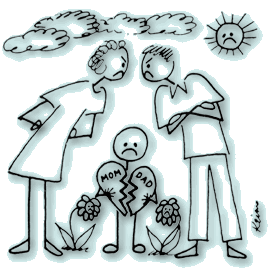 Children of Divorce
Children of DivorceI often ask myself why I teach the Saturday morning Co-Parenting class. Not being a morning person, it is difficult for me to get up at 6:30 a.m. I'm not very comfortable talking in front of groups. Yet here I am, on a Saturday morning, waiting for the parents to arrive and wondering if I am going to do a good job for them. Then I remembered a phone call from a young man I have known for years.
He began talking about his growing up time. "It seems everything was normal and we were a happy family," he said. "Then there was a lot of arguing and yelling. It was a very stressful situation and it was not pleasant. I did not know why my parents fought, but it went on for years." He talked about his parents' separations. His father was gone, then home, then gone, then home and finally out of the house for good. And in between, there was tension and arguments that drew him and his siblings into the fight. "No one told us what was going on," he continued. "I just remember there was a lot of anger."
We talked for a few minutes and when the conversation was finished, I told him the same thing I always tell him at the end of our phone calls. "I love you, Thom," I said. "I love you, too, dad," he replied.
I reflected on my son's comments as I watched an Ophra Winfrey special on children of divorce. Parts were very difficult to watch and tears welled up in my eyes. I heard a noise behind me and turned to see two Center staff members dabbing their eyes with tissue. The separation process can be very painful for children and leave them damaged as adults. Co-parenting classes had not been invented when I went through the process. I may have done things much differently if I could have attended a class that talked about communicating with children, not arguing in front of them and not blaming the other parent for all that went wrong in the relationship. Why do I teach the Saturday morning Co-Parenting class? Partly as an atonement for putting my children through the hell of my divorce. But mostly because I have an opportunity to reach out and help parents not make the same mistakes, and to keep their focus on their children, not on themselves or the other parent. From time to time I reach a mom or dad and I know I have made a difference in their lives and the lives of their children. It's still painful, but maybe I have helped them think about what they are doing and how it is affecting their children.
The parents in this class have registered, paid their class fees and have settled in the training room, nervous and not knowing what is going to happen to them. I take a deep breath, gather myself for a moment, walk into the room and stand before them. "Good morning, parents!", I say. Another Saturday morning parenting class begins. And I know why I am here.
Chuck Hardwick


















